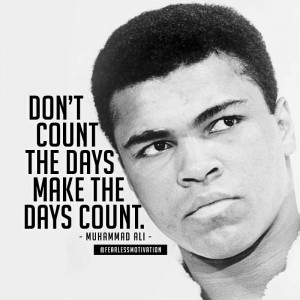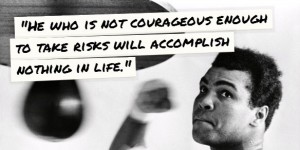 By Scott T. Allison and George R. Goethals
By Scott T. Allison and George R. Goethals
Declaring oneself a hero doesn’t ordinarily do the trick. But former Heavyweight Champion Muhammad Ali was an international hero in the eyes of sports fans and ordinary citizens around the world. Ali began calling himself “The Greatest” early in his career, and clearly alienated many. Now people generally realize that his braggadocio was always part of the act, something that enabled him to perform at his best in the ring, and entertain and inspire millions.
His odyssey to heroism was complicated, but by the time of the 1996 Olympics in Atlanta, Georgia, there was no question as to which American medal winner would light the torch at that year’s Games. Two years later, it was only a bit of a surprise when corporate America fully endorsed Ali by putting him on a box of Wheaties cereal, The Breakfast of Champions. The citation on the box credited Ali’s impact in sports and beyond: “he was a courageous man who fought for his beliefs” and “became an even larger force outside the ring with his humanitarian efforts.”
When Ali, then Cassius Clay, won the heavyweight championship from Sonny Liston in 1964, large portions of white America were uneasy. Although Liston was widely associated with organized crime, and seemed like something of a thug, rumors also circulated about Clay being associated with “Black Muslims.” Many people found this truly frightening. And although Ali’s wit and boxing skills were extremely entertaining, almost as many were turned off by the talking and bragging of “The Louisville Lip” or “Gaseous Cassius.”
In short order, some of people’s worst fears were confirmed. Clay turned to Islam and took the name Muhammad Ali. He became a vocal critic of the Vietnam War and was arrested for refusing to be inducted into the armed services. Ali’s resistance  to the draft on the grounds that he was a Muslim minister struck many as ludicrous. But he fought in court for his deferment from the army and eventually won in a unanimous Supreme Court decision. However, his legal struggles kept him from boxing for three and a half years, costing him precious time at the peak of his career. But he had proved the depth and sincerity of his beliefs. At the same time, more and more people believed that he was correct to defend African American’s rights to their own values and self-respect, and in his opposition to the Vietnamese war.
to the draft on the grounds that he was a Muslim minister struck many as ludicrous. But he fought in court for his deferment from the army and eventually won in a unanimous Supreme Court decision. However, his legal struggles kept him from boxing for three and a half years, costing him precious time at the peak of his career. But he had proved the depth and sincerity of his beliefs. At the same time, more and more people believed that he was correct to defend African American’s rights to their own values and self-respect, and in his opposition to the Vietnamese war.
Eventually Ali got the chance to win back the boxing title he had lost while he was banned from fighting, and that he failed to regain when he met Joe Frazier in 1971. The year was 1974, ten years after he first won the title from Sonny Liston. He fought a classic battle against George Foreman in the African nation of Zaire, now called Congo. That year he was named Sportsman of the Year by Sports Illustrated and it was clear that most Americans had come to embrace a talented and dedicated athlete who had both overcome racial and cultural barriers and had the courage to define himself and to help and encourage other black Americans to do the same.
After regaining the title from Foreman, Ali fought for several more years. But the numerous punches he had absorbed during his long career made him the victim of Parkinson’s syndrome, a neurological disorder which makes motor activity, including walking and talking, extremely difficult. During his lifetime, Ali fought outside the ring for those he regards as his people, and he is a hero to most of America. His skill, his struggle, his commitment, his charm and his charisma were inspirational. He was one of the most recognized and admired people in the world. Both he and the nation have come a long way since he burst on the scene as a sassy young fighter who perplexed or repelled much of the country. For many, he will always remain an important hero.
- – – – – – –
Ali’s athletic achievements are enough to allow him to be considered a sports hero to many, but it is his dedication to his beliefs that allows him to be more than a boxing icon. Ali’s objection to the war was well-documented, but in not participating in it and going to jail, he was giving up years of his prime, money, and more championships. The fact that he accepted this punishment to stand up for what he believed in makes him a true hero.
I agree with Jack Thomas. Ali could have gone to Canada like many other conscientious objectors did, but he was willing to go to jail to make his point; and he took his fight to the highest court in the land and won. This earned him a huge amount of respect in my book.
Also, he can float like a butterfly and sting like a bee. 8)
Muhammad Ali has undoubtedly gone down as one of the greatest athletes ever. He was a feared competitor in the ring with a swagger like no other. He was cocky but had the right to be. However, i never knew much about his life outside the ring. For him to be imprisoned for what he believes is truly heroic, especially since it was in the prime of his career.
Muhammad Ali is a hero to many in the boxing world. Being one of the best boxers to ever enter that violent sport. Even though he is feeling the effects now, he we always be known as the best and one who was nearly unbeatable. It will be hard to match Alis speed.
Ali reminds me of Big Iron somewhat, in the sense that, at first, people didn’t know what to think of him. His bragging and differences in the public’s eyes made the public unsure whether he was a hero or a villain. His greatness in and out of the ring was recognized eventually however and he has fortunately been embraced as a hero.
Muhammad Ali is one of my heroes no only because of what he did in the ring but mostly becuase of what he did outside of it. He is the best boxer to ever enter the ring and is one of the greatest athletes to ever play a sport. He is and should always be look at as a hero.
Muhammad Ali has clearly ironed himself into history for not only his incredible boxing talent and charisma but also his great moral courage for standing up for what he believed in. Knowing that he could lose everything he had built for himself in the boxing world by standing behind his beliefs is an extraordinary act or heroism and commitment. Ali will forever go down as a hero for what he accomplished both in and out of the ring.
As a long time athlete and avid sports fan I have naturally idolized the charisma and ability of Muhammed Ali for as long as I can remember. Ali’s undeniable confidence seems to be contagious and leaves a spectator itching for the raw talent and cocky-ness that exists in Ali. As a truly monumental African American boxer and athlete, Ali will always be viewed as a hero for his talent, strength and charisma.
I have always heard about Ali and his great fighting ability within the boxing ring. However, I never knew how influential he was outside of the ring as well. I had no idea that he went to the Supreme Court in defense of his heritage and customs or that he was so nationally and internationally recognized. He fought against many odds but was still able to come out on top. He is truly a hero.
Muhammad Ali is one of the few sports figures who has inspired so many people in so many different contexts. What I like most about Ali is that he was able to turn sport into something more than just entertainment; he portrayed boxing as a cultural event with the power to change social values. His physical prowess, strong adherence to his values and beliefs and humanitarian endeavors certainly make him a hero in my book.
A couple of years back, this program I was in took us on an excursion to see a play about the life of Muhammad Ali. I have a better appreciation for what he did in life and for his accomplishments. He is truly a hero and I am glad to read more about him.